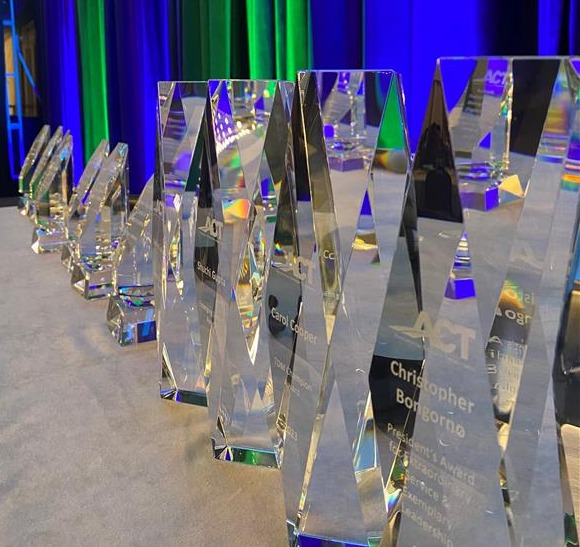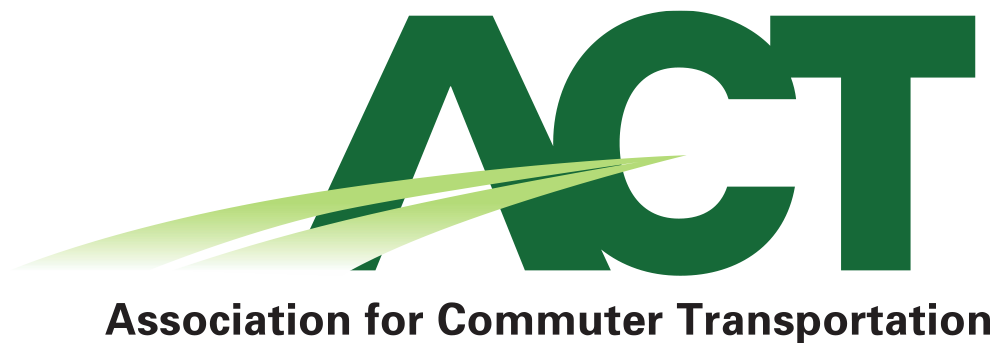2025 ACT National Awards - Submissions due April 11

Each year, the Association for Commuter Transportation (ACT) recognizes and honors outstanding achievements in the field of Transportation Demand Management (TDM) at the annual ACT International Conference.
Winners of past awards have included individuals, public and private sector agencies, businesses, non-profit organizations, colleges and universities, business associations, transportation management associations, and transportation providers.
Nominations are now open for 2025! Please note that categories have changed, so be sure to carefully review them below.
Submissions will close on Friday, April 4.
2025 award categories and criteria
Visit the dropdown menus below to learn more about each award.
The ETC Champion Award is presented to a person who is responsible for transportation programs for an organization that best demonstrates a commitment to promoting and advancing commuter transportation options.
Criteria
1. Please provide a description of the nominee's employer organization, the TDM strategies implemented for that organization, and the overall goals.
2. Outline the approach and methods used to achieve the stated goals (e.g., channels, platforms, partnerships, tools).
3. What metrics were used to measure success/impact?
4. Provide quantitative and qualitative results, such as changes in awareness or behavior.
5. Please provide any additional information you think will add to the nominee's nomination.
The Excellence in Advocacy Award acknowledges an ACT member whose advocacy efforts on behalf of TDM, whether at the local, state, and/or federal level have been exceptional. The award celebrates effort, innovation, efficiency, and effectiveness and includes both individual advocacy efforts along with the organization and encouragement of others’ participation in advocacy.
Criteria
1. Please provide a brief description of the research for which the nominee is being nominated.
2. Please describe the nominee's advocacy efforts and any direct outcomes that resulted from these efforts.
3. How will/has these advocacy efforts benefit(ed) or advance(d) the field of TDM and/or one of its sub disciplines?
4. Did this advocacy effort help further equity of TDM? If so, please explain.
5. Please provide any additional information you think will add to the nominee’s nomination.
The Excellence in Research Award acknowledges an ACT member or organization for recent research in transportation demand management, one of its sub disciplines, or in a related field when the research demonstrates applicability to TDM goals. Collaborative efforts may be recognized so long as one member of the team is an ACT member.
Criteria
1. Please provide a brief description of the research for which the nominee is being nominated.
2. How will/has this research benefit(ed) or advance(d) the field of TDM and/or one of its sub disciplines?
3. How was the research funded? Please provide the monetary amount your research was given.
4. Did this research effort help further equity of TDM? If so, please explain.
5. Please provide any additional information you think will add to the nominee’s nomination.
The Outstanding Building/Development Award recognizes a facility that provides commuter friendly infrastructure, programs and services, and demonstrates clear metrics to measure reduction of single occupant vehicle trips during peak hours of traffic congestion.
Criteria
1. Provide a brief description of the nominee’s building/development.
2. What transportation related facilities and improvements does the building/development have to qualify to receive this award?
3. What parking management strategies does the site maintain to qualify to receive this award?
4. What transportation promotions, services, and/or policies does the site maintain?
5. Explain how the facility engages and educates users to its infrastructure, programs, and services.
6. Did the program address commuters specifically to encourage representation and participation of diverse groups of people including genders, races and ethnicities, abilities and disabilities, religions, cultures, ages, and sexual orientations?
7. What are the outcomes of the nominee’s efforts on advancing transportation options and positively supporting users at their development site for a lasting impact? Please include quantifiable outcomes.
The TDM Plan of the Year Award recognizes an organization or entity that has developed a new TDM plan for a worksite, community, region, campus or development within the last two years.
This award honors a plan that demonstrates a strategic, well-executed approach to promoting alternative transportation options such as public transit, biking, walking, carpooling, and telecommuting. Winning plans incorporate data-driven decision-making, strong stakeholder engagement, and a focus on future measurable results that showcase a meaningful impact on traffic congestion, air quality, and overall travel behavior.
Criteria
1. What transportation challenges did the plan aim to address, and what specific goals and objectives were set?
2. How did data influence the development and implementation of the plan? What data sources were used, and how did they guide decision-making?
3. Who were the key stakeholders involved in developing the plan? How did their input shape the plan's goals and strategies?
4. What specific results were achieved through the plan? Include key performance indicators related to traffic congestion, air quality improvements, and changes in commuter behavior.
5. What sets this TDM plan apart from others? Describe any unique approaches, technologies, or methodologies that were incorporated.
6. Please provide any additional information you think will add to the nominee’s nomination.
This award category recognizes a single TDM strategy that has had a significant impact in changing travel behavior through planning, programs, policies, incentives, pricing, data, and/or technology. This award highlights an effective initiative that influences travel modes, routes, departure times, number of trips, or location and design of work spaces or public attractions.
Successful submissions will showcase TDM strategies that address transportation challenges. Examples might include reducing congestion in a construction corridor through incentives, data, and education; boosting bike commuting with subsidies, discounts, and tune-up clinics; a new commuter concierge
service offering trip plans, trial passes, and incentives; or enhancing transit access through a developer ordinance integrating service expansion, multimodal infrastructure, and affordable housing. Winning entries will demonstrate measurable transportation improvements.
The nominated TDM strategy should have clear goals and demonstrate progress towards achieving those goals.
Criteria
1. Provide a concise summary of the strategy’s purpose, target audience, and primary focus.
2. Who were you aiming to reach and why? Include demographic or psychographic details.
3. Outline the approach and methods used to achieve the stated goals (e.g., channels, platforms, partnerships, tools).
4. What metrics were used to measure success/impact?
5. Provide quantitative and qualitative results, such as changes in awareness or behavior.
6. Explain if and how the implementation of this TDM strategy could be adapted or reproduced in other contexts or regions.
7. Please provide any additional information you think will add to the nominee’s nomination.
The Best Overall Marketing Campaign recognizes a campaign that was designed to educate and inform an identified audience about their commuting options, the impacts of transportation on the environment, transportation planning, and other related topics and concerns. The winning campaign will have demonstrated a high level of creativity and originality, and can show measurable results including increased audience engagement, increased brand awareness, mode shift, or significant behavior change.
Criteria
1. Please describe the marketing campaign.
2. What were the goals and objectives of the marketing campaign?
3. What was the budget of the marketing campaign?
4. How did this promotion or marketing campaign engage, educate or inform the public, employees, tenants, and/or students about their commuting options or the broader ideas of transportation planning, impacts of transportation on the environment, or other related concerns?
5. What were the outcomes of the promotion or marketing campaign?
6. How can this promotion or marketing campaign be transferred or implemented by other organizations or locations?
7. Please provide any additional information you think will add to the nominee’s nomination.
The Outstanding Innovative Partnership Award recognizes creative and impactful collaborations between organizations, whether public, private, or non-traditional partners, that address transportation challenges or deliver new TDM solutions. This award highlights partnerships that bring together diverse sectors, such as municipalities, transit agencies, non-profits, employers, or community organizations, to implement TDM initiatives. The successful program or project should demonstrate how collaboration between these partners achieved meaningful outcomes for the organizations involved and the communities they serve, with a focus on solving transportation issues.
Criteria
1. Please specify the organizations involved in the partnership and their purpose or industry.
2. Please provide a summary of the program or project. What was the impetus for the program or project? Who was the intended audience for the program or project? What were the goals and objectives of the program or project?
3. What were or have been the outcomes of the program or project? How were these measured?
4. How has the broader community benefited from the outcomes of the program or project?
5. Please provide any additional information you think will add to the strength of this nomination
The TDM Industry Impact Award recognizes a local, regional or statewide TDM program, organization, or entity that has demonstrated outstanding leadership and impact in advancing TDM goals. This award honors a comprehensive, high-impact TDM effort that effectively improves mobility, reduces congestion, and promotes travel options. Eligible applicants may include, but are not limited to:
- Transportation Management Associations (TMAs) or Organizations (TMOs)
- TDM programs operated by a transit agency, metropolitan planning organization (MPO), or local government
- Statewide TDM programs or initiatives that provide support, guidance, or coordination across multiple regions
- Nonprofit or private-sector organizations that offer dedicated TDM services and have a demonstrated impact on travel behavior
Criteria
1. Provide a concise summary of the nominee’s purpose, target audience, and TDM-related goals.
2. Outline the strategies, approaches, and methods used to achieve the stated goals.
3. What metrics were used to measure the success of impact of the nominee?
4. Please provide any additional information you think will add to the nominee’s nomination.
Community Builder Award recognizes individuals and organizations that have made significant contributions to strengthening community connections within a region or work site. This award honors those who cultivate collaboration and enhance accessibility through community based TDM strategies.
Criteria
1. How has this program/individual fostered a stronger sense of community through their TDM programs?
2. How has this individual or program demonstrated a commitment to creating services for all members of the community?
3. Has this program or individual implemented initiatives that improve access to transportation options for underserved communities or areas of persistent poverty? If so, please explain.
4. Has this program or individual worked to create opportunities for collaboration among all stakeholders, including local governments, businesses, and community organizations? If so, please explain.
5. Has this program or individual developed strategies to engage and support a broad spectrum of commuters, including students, seniors, and workers in various industries and work schedules? If so, please explain.
6. Has this program or individual raised awareness of the role that transportation plays in building strong and thriving communities? If so, please explain.
7. Please include any additional justifications as to why this person or program should be recognized for outstanding achievements in building stronger communities.
Questions can be directed to Casey Murphy.
